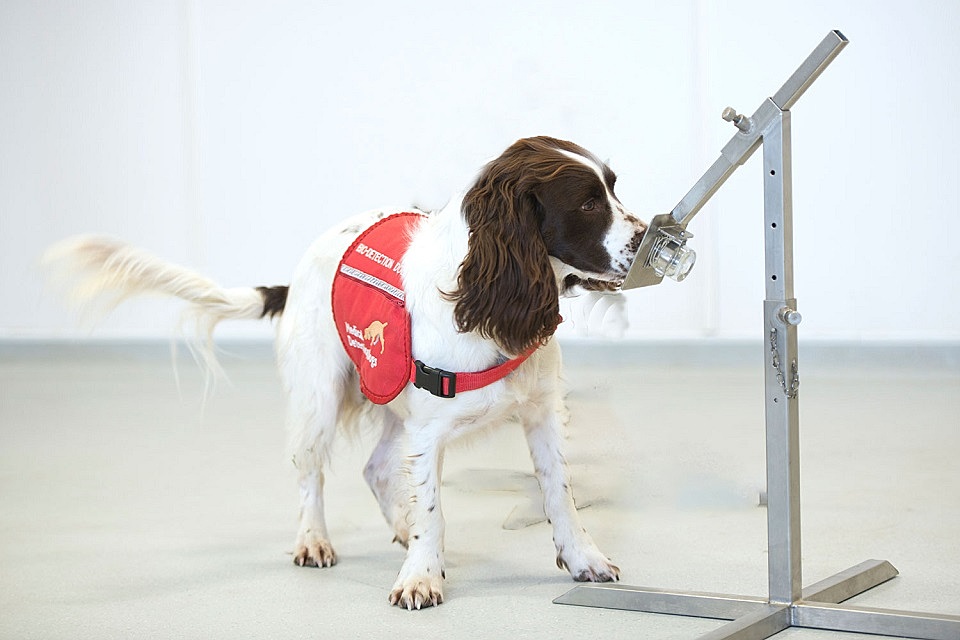Press release from Medical Detection Dogs:
For the first time, the Government has recognised the impact that dogs can have in fighting disease by supporting a project to investigate whether they can play a role in preventing the spread of COVID-19.
Medical Detection Dogs (MDD) has spent years successfully researching the science behind dogs’ sense of smell and believes that dogs could detect COVID-19. We have always adopted a rigorous, scientific approach to our work, and produced more than a dozen peer reviewed research papers which support our belief that each disease has its own unique odour. Medical Detection Dogs will be working in partnership with the London School of Hygiene and Tropical Medicine (LSHTM) and Durham University, bringing together the team which recently collaborated to successfully prove that dogs can be trained to detect malaria.
Word of government funding means the collaborators can start collecting samples of the virus and making them safe for presentation to the dogs, with the aim of providing a rapid and non-invasive detection method that could help prevent a second peak and enable precious NHS resources to be used where most needed.
MDD has already started training a number of hand-picked dogs which have completed their basic training and will be ready to transfer to the new samples as soon as they arrive at our training centre. We hope to have initial results confirming the presence of an odour which the dogs can detect within 6-8 weeks after samples arrive.
The dogs searching for COVID-19 will be trained in the same way as those we have already trained to detect diseases like cancer, Parkinson’s and bacterial infections – by sniffing samples in our training room and indicating when they have found it. They are also able to detect subtle changes in temperature of the skin, so could potentially tell if someone has a fever.
Once trained, dogs could also be used to assist with the rapid screening at key points of entry to identify travellers entering the country infected with the virus or be deployed in other public spaces, which could have a transformational impact on the response to the epidemic.
Commenting on the news, Dr Claire Guest, CEO and Co-Founder of Medical Detection Dogs, said: “We are delighted that the government has given us the opportunity to demonstrate that dogs can play a role in the fight against COVID-19. They have the potential to help by quickly screening people, which will be vital as the country moves out of lockdown. Hopefully this will prevent a second peak and enable precious NHS resources to be used where most needed.
“We have already demonstrated our expertise in canine disease detection by successfully training dogs to detect diseases like cancer, Parkinson’s and malaria, and we apply that same science to train life-saving Medical Alert Assistance Dogs to detect odour changes in individuals caused by their health condition.
“We are sure our dogs will be able to find the odour of COVID-19 and we will then move into a second phase to test them in live situations, following which we hope to work with other agencies to train more dogs for deployment. We are incredibly proud that a dog’s nose could once again save many lives.”
Professor James Logan, lead researcher for the work and Head of the Department of Disease Control at the London School of Hygiene & Tropical Medicine, said: “Our previous work has shown that malaria has a distinctive odour, and with Medical Detection Dogs, we successfully trained dogs to accurately detect malaria. This, combined with the knowledge that respiratory disease can change body odour, makes us hopeful that the dogs can also detect COVID-19.
“I would like to thank the UK government for their support of this pioneering research through this funding. We’re excited to do this trial, and confirm whether these bio detection dogs can be used to screen for COVID-19 at ports of entry such as airports.
“If successful, this approach could revolutionise how we diagnose the virus, leading to the rapid screening of high numbers of people, which could be profoundly impactful and help get our lives back to some sort of normality.”
Professor Steve Lindsay, from the Department of Biosciences at Durham University, said: “We’re absolutely delighted to be awarded this funding so we can start this important research.
“If we can show that our trained dogs can identify people carrying the virus, but who are not sick, it will be a game changer. We will then be able to scale-up the use of dogs at ports of entry to identify travellers entering the country with the virus. This will be important to prevent a second wave of the epidemic.”
Play the video to learn about how the team has already worked together to train dogs to detect malaria.




